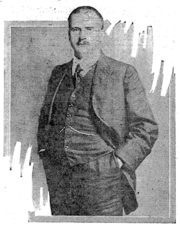 Carl Gustav Jung (1875-1961) was a Swiss born psychiatrist and contemporary of Sigmund Freud. After quite some time of collective study and correspondence with Freud, the pair had a falling out which had a dramatic effect on both Jung's personal life and his later theory. Jung's psychological theory, which he labeled Analytic Psychology, while maintaining the basic premises of psychoanalysis, was a stark contrast to Freudian theory.
Carl Gustav Jung (1875-1961) was a Swiss born psychiatrist and contemporary of Sigmund Freud. After quite some time of collective study and correspondence with Freud, the pair had a falling out which had a dramatic effect on both Jung's personal life and his later theory. Jung's psychological theory, which he labeled Analytic Psychology, while maintaining the basic premises of psychoanalysis, was a stark contrast to Freudian theory.While Jung agreed with Freud on the important role of the unconscious on our conscious experience, he found that Freud placed far to much weight on the influence of our sexual desires. Jung described the unconscious as much more productive than Freud, claiming that it could provide much useful insight into the wants, needs, desires, troubles, and so forth of the individual in question. While realizing that the unconscious could not be directly accessed, Jung believed that the motives of the unconscious could be realized through secondary roots such as dream analysis, free-association, and through the humanities (for example in paintings, music, and literature).
A central idea of Jung's analytic psychology is that of archetypes, the idea bares a striking resemblance to the Platonic idea of Forms. In Jungian psychology, the individual seeks to reconcile himself with the archetype of a person, and the unconscious plays a vital role in this process. Jung identifies a section of the mind which he labels the collective unconscious, this can be best described as the totality of human experience, however this is not an aspect of our mind which is available to us directly. It is however available to us in the same way that the rest of our unconscious is available; through symbolic representation in mediums such dreams, mythology, and the arts. The primary concern of Jung's Analytical psychology was the study of how the collective unconscious influences personality. Understanding of the psyche in this way was undertaken through thorough exploration of the disciplines such as anthropology, astrology, mythology, and philosophy.
Jung identified two distinctive personality characteristics, and believed that all people could be placed into one of two categories:
- Introverts: are those whose focus is generally directed inward; a focus on ones thoughts and feelings. Typical characteristics of an introvert include shyness, contemplativeness, and reservedness. Introverts may have trouble adjusting to social situations. Introverts are often subject to such behavior as daydreaming, over-consideration, procrastination, and withdrawal from and aversion to stressful situations.
- Extroverts: are those whose focus is outward, to the external world and the people in it. Extroverts are characterized by outgoing behavior, social attentiveness, high activity, aggressiveness, and fast (sometimes rash) decision making
Jung stressed that both characteristics were present in all people, however, there was almost always an imbalance or tendency towards one set of characteristics than another. The two categories of people could be seen as opposites on a continuum with no exact midpoint, individuals fall somewhere on the continuum showing more or less orientation towards one set of tendencies. Jung also identified four functions of the mind: Thinking, Feeling, Sensation, and Intuition. He describes these four functions as the way in which we experience the world.

No comments:
Post a Comment